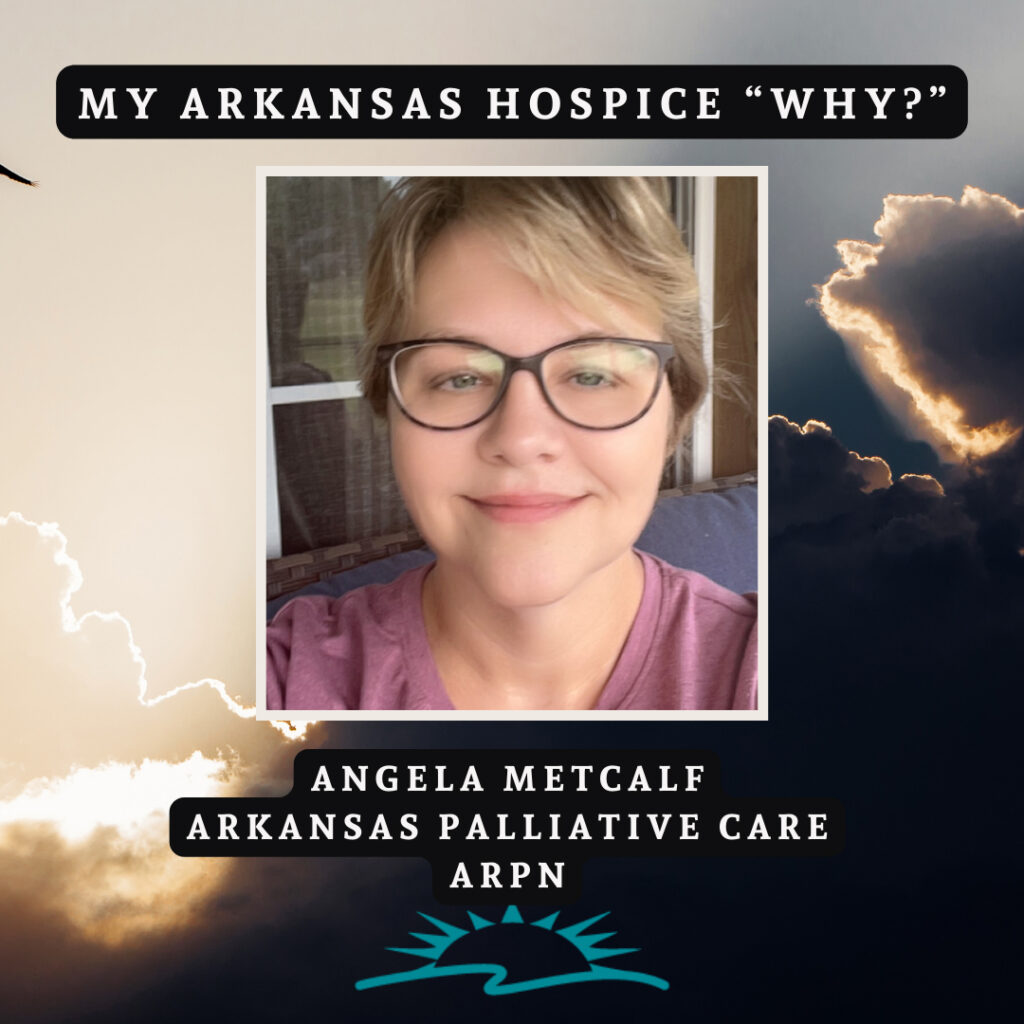By arhospice on September 11th, 2024
By Angela Metcalf, APRN
Arkansas Palliative Care
At the tender age of 15, my world was a whirlwind of motorcycle rides and fishing trips, always accompanied by my best friend. We met when I was just six, and together, we grew up exploring life’s simple joys — catching tadpoles, riding bikes and skateboards, and later, mastering go-karts and motorcycles. Our bond was unbreakable, but life had other plans. Tragedy struck, and he was taken from me in an instant. The devastation I felt was indescribable, but I channeled that pain into something meaningful. I learned CPR, became an EMT, and eventually pursued paramedic and RN school.
Throughout those years, I faced more heartache, losing many loved ones, including all of my grandparents. Then, in 2010, my beloved mother-in-law, Libby, was diagnosed with stage IV breast cancer. This was a realm of medicine I had always avoided, but there we were, confronting it head-on. Libby viewed chemo as her lifeline, and for seven years, I watched her battle bravely, learning alongside her. I thought I understood cancer, but the reality was far more complex.
We were told her cancer was “chronic,” a term that left us confused and hopeful. Chronic conditions like COPD allow for a quality life with the right medications, so why couldn’t cancer be the same? I adored Libby, and perhaps I wore blinders, trusting the oncologist’s recommendations without question. These decisions and their consequences haunt me daily, but as a caregiver, my role was to support Libby in whatever she chose.
I rarely missed her treatments, standing by her side through it all. In 2017, I gently suggested exploring other options, but she held firm, believing chemo was her only hope. On February 13, 2018, after a long shift as Charge at JRMC ER, I rushed back to the hospital with a very ill Libby. The doctors knew her well, and this time, their faces told a different story. Dr. Curry showed me the CT scan, pointing out every lesion on her liver. The words were unspoken, but the truth was clear — our time was running out.
The next day, Valentine’s Day, we faced a harsh reality. Her oncologist, with a cold, clinical demeanor, told Libby to go home on hospice. The words cut deep, but as a medical professional, I understood the gravity behind them. Libby had her abdomen drained and came home on hospice that very day. We focused on making memories, believing we had more time, but in reality, we had just 19 days. She left us bravely, but the loss was shattering.

In 2018, instead of testing for my APRN, I chose to become a travel nurse. I worked across the states, always feeling that something was missing in healthcare. That missing piece was the “in-between” — the education and support following a chronic diagnosis. When faced with such a diagnosis, patients and families often have no guidance, no plan, just the recommendations of a specialist. But the truth is, palliative care fills that gap. It addresses the “what ifs” and provides a roadmap, making the harsh realities more bearable.
Today, Libby’s legacy lives on through my work with Arkansas Palliative Care. I help patients and their families understand their options, navigate the complexities of healthcare, and see beyond the binary choice of treatment or death. Each patient is unique, and their care should reflect that. This is my passion, my purpose, my “why.” Libby’s journey taught me the importance of compassion, understanding, and the vital role of palliative care. Through my work, I honor her memory and strive to make a difference in the lives of others.
Click here to see how Arkansas Palliative Care provides support and comfort beyond treatment.
Click here to see how Arkansas Hospice’s Family of Care provides expert care, where you are.

About the author: Angela Metcalf is a nurse practitioner for Arkansas Palliative Care. This blog was originally published in the Arkansas Hospice Foundation Weekly Connection email newsletter for staff and board members as part of a feature asking Arkansas Hospice Family of Care team members to share why they find their roles fulfilling.


 Registered 501(c)(3). EIN:
Registered 501(c)(3). EIN: